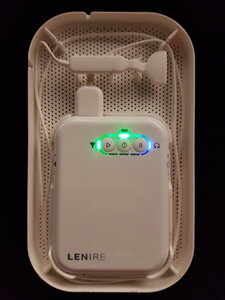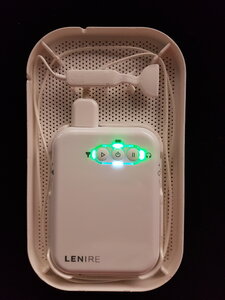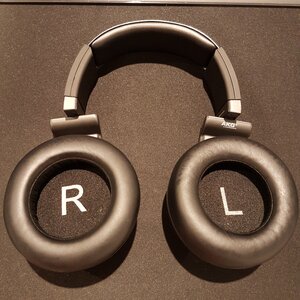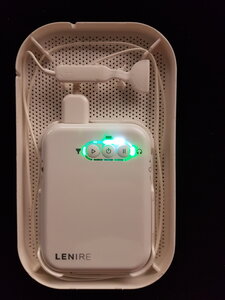Have you noticed any changes in your tinnitus yet? I had a somewhat scary conversation with the fitter, who said that most users experience "changes" in pitch, tonality, loudness and intrusiveness at the beginning and not always in a positive way!
I had a similar chat with the consultant who said pretty much the same, and that the noise can "move" to other parts of the head. An interesting comment she made was some people have come back reporting their tinnitus has improved, but when they do the masking test etc there is no record-able difference in the amount of white noise it takes to mask.
I guess the thing to take away is an improvement doesn't necessarily equate to a reduction in loudness, but can mean overall reduction of intensity or intrusiveness of the frequency.
It's my first day using the treatment properly and although my tinnitus does seem much quieter today I put this down to being distracted with work and having fans on everywhere in the house due to the heat. There's no way it works that quickly!
Can you give us a summary of the experience of using the device? Like a full picture start to finish.
Absolutely.
So as per the instructions from Lenire, find a comfortable seated position - upright preferably. In their words, this reduces the risk of you falling asleep during the treatment and the tongue tip losing contact with your tongue.
Switch on the Lenire device by pressing and holding the power button, you'll get a green battery light (top light) which indicates the battery is well charged. This turns orange when the battery needs charging. If the tongue tip is already plugged into the device, the status light for the tongue tip will pulse green (Left hand light).

There is also a status light for the Bluetooth headset (right hand light) which pulses blue until the headset is switched on and pairs automatically. So before treatment can start, you have to make sure this is connected and the status light changes from pulsing blue to solid green.

Once everything is plugged in and paired (it's very easy) you will notice the white light that appears directly underneath the power button. This basically means the device is ready to go and treatment can begin.
Place the tongue tip over your bottom lip so your lip sits just behind the notch and rest the metal nodes onto your tongue. It takes a bit of fiddling at first to find a comfortable position so you're not forcing your lips closed or pressing your tongue up the entire time. As soon as your tongue makes contact with the nodes, the pulsing green light goes to a solid green light.
Pop the headphones over your ears, they're comfortable enough for the length of treatment. During the training they do emphasize the importance of making sure the correct speaker is over it's corresponding ear, R - Right and L - Left. This is due to the device being configured for your audio profile and hearing levels in each individual ear. They've made this pretty easy...

Now everything's switched on, in your mouth and over your ears you can press play. You'll notice the white LED will begin to rotate clockwise around the light bars.

The first thing you'll hear is white-noise, it sounds very similar to waves on a shoreline or wind rushing through tree's - very soothing. There's a mixture of raindrop noises alongside slow piano chords. This in my opinion, is just ambient sound to make the experience more soothing. The important sound comes in the form of a strange chirp (I don't know any other way to describe it) -
@Redknight @Allan1967 you guys might be able to explain that sound better than I can.
This "chirp" is much faster in that it will play multiple chirps per piano chord but they're still in sync. The reason I say this is the important sound is because as soon as the chirp begins, your tongue tip will begin to give off synchronized tingles onto your tongue. It's not an uncomfortable sensation, but it is very foreign in that it's difficult to relate to other feelings. They're very isolated tingles / pops in the exact position of the metal nodes on the tongue tip.
FYI - According to the product specialist at Lenire, these "tingles", their frequency and the way they are sync'd with the sound depends on the treatment you've been given. The impression I got here is there is more than one pattern that Lenire can choose from to set on your device (My interpretation of what was said, not fact).
The music varies slightly throughout the treatment, sometimes the white-noise is more prominent, sometimes the piano chords and chirps are more prominent.
Around 20 minutes into my treatment the white-noise was much louder than any other sound coming through the headphones - almost borderline with what I'd consider as my comfortable max volume and this lasted for a few minutes, at which point it returned to its default level alongside the other sound effects.
Truthfully, after 20 - 25 minutes of sitting, doing nothing and listening to the "music" it does get a little boring and you find yourself struggling to not get distracted by other things.
As the treatment ends, the music begins to fade out gently - there is no abrupt stop in sound. It's a gentle gradient until the sound fades into nothing. This indicates the end of the treatment and the white light will return back to its position under the power button.
Overall - The treatment is by no means uncomfortable, distressing or overbearing. It's a very user friendly piece of equipment and the treatment seems to have been refined to match. Volumes can be adjusted, intensity of the tongue tip can be adjusted and all the equipment is charged via USB which is handy. They do provide a charger in the box!
That's about as much as I can explain having only used it for 30 minutes, if there's anything particular you want to know then you're welcome to ask.

 Member
Member


